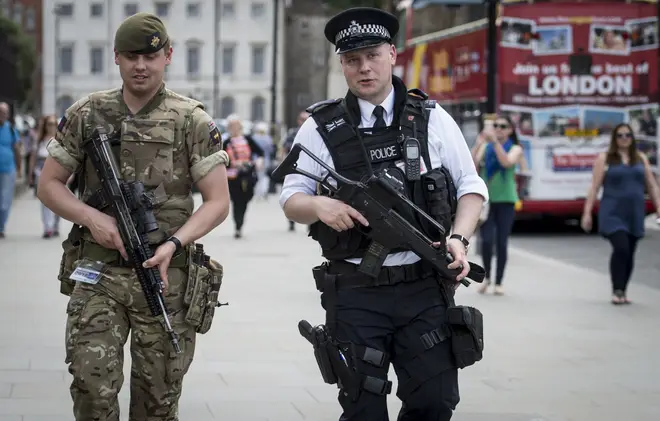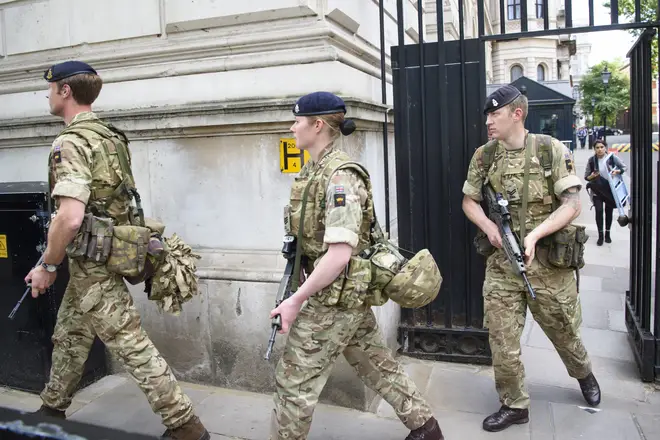
Oli Dugmore 4am - 7am
31 July 2020, 17:51

The government has been warned that police may need support from the army to deal with a 'summer of serious disorder' in the UK.
The warning comes after the publication of a report entitled 'Public Disorder and Public Health: Contemporary Threats and Risks' which states that UK police are in a far weaker position in terms of capacity to deal with threats.
The report was published by the SAGE SPI-B Policing and Security sub-committee.
In the report, the government is told that police face a number of issues as lockdown eases in the UK, including the reopening of pubs and an increase in the frequency of raves and house parties.
The report says: "If serious disorder does develop, it will have a detrimental impact on public health, facilitating the spread of disease, making the re-imposition of measures to control the spread of Covid-19 next to impossible and would be likely to require military support."

The report also states: "The threats currently facing the UK are diverse, inter-connected and dynamic.
"Public health will be particularly adversely affected by spontaneous public assemblies, particularly if these develop into violent confrontation.
"Local lockdown carries with it a series of threats to social cohesion and public order.
"Some media narratives are reinforcing claims that Asian and Black people in areas of local lockdown are potentially responsible for disproportionately spreading the virus."
The police are in a far weaker position in terms of capacity to deal with these threats than in 2011 and police weaknesses, when recognised, were a factor in the spread of urban disorder during those riots.
"Policing has a vital role to play in preventing disorder but coordinated action is needed across Whitehall and with local authorities. This is not simply a policing issue."
NEW: Extraordinary document just published by SAGE sub-committee SPI-B (which focuses on behavioral science) on what it calls the risks of "widespread urban disorder" this summer. 1/
— Ben Kentish LBC (@BenKentish) July 31, 2020
Government scientific advisers warn that there has been a "step change" in the threat of serious riots since 2011 but that police "are in a far weaker position" to respond. As a result, the response to any disorder "would be likely to require military support".
— Ben Kentish LBC (@BenKentish) July 31, 2020
In the coming weeks and months, they say, the UK "will face grave challenges to public order". The country is "precariously balanced" and without government action, they warn, "amplification of the conditions for serious disorder in multiple locations is likely to develop".
— Ben Kentish LBC (@BenKentish) July 31, 2020
LBC Westminster correspondent Ben Kentish explained: "Extraordinary document just published by SAGE sub-committee SPI-B (which focuses on behavioral science) on what it calls the risks of 'widespread urban disorder' this summer.
"Government scientific advisers warn that there has been a 'step change' in the threat of serious riots since 2011 but that police "are in a far weaker position" to respond. As a result, the response to any disorder 'would be likely to require military support'.
"In the coming weeks and months, they say, the UK "will face grave challenges to public order". The country is "precariously balanced" and without government action, they warn, "amplification of the conditions for serious disorder in multiple locations is likely to develop".
"This would have devastating consequences. They say: "Put simply, a serious deterioration of public order could overwhelm all attempts to control contagion, overwhelm hospitals, the criminal justice system and hinder revival of the economy." An extraordinarily stark warning.
He continued: "That might sound far-fetched but not so, according to the scientists. They say there is a "high risk of civil disorder across multiple sites, with serious implications for public health".
"Such a situation would mean "a security crisis would ensue, undermining public trust in the government and catastrophically undermining its Covid-19 recovery plans". The decision to reopen pubs would "complicate these problems and introduce entirely new ones", they say.
"SPI-B members also said that there is evidence that some of the illegal raves and parties that have taken place were arranged and funded by Organised Crime Gangs "to create a market for drug supply". There is also evidence of links to "BLM protests and ideologies", they said.
"It's hard to overstate how unusual the language in this report is. SAGE and its sub-committees do not usually make warnings as stark as this. The report was "considered" by the whole of SAGE on 2nd July - we don't know, though, what was discussed or what the response was.